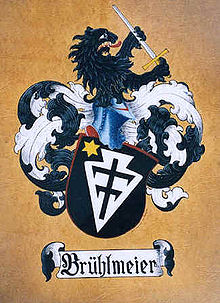Bruehlmeier
The family name Brühlmeier is a gender from Wettingen ( Switzerland ) in the canton of Aargau . The family is old-fashioned in Wettingen and branches of the family were naturalized in the Zurich municipalities of Thalwil , Kilchberg and Zurich in the course of the 20th century .
Origin of the family name
Most of the village of Wettingen came into its possession after the Wettingen monastery was founded in 1227 . The peasants had to pay a fee to the monastery. The monastery named the 8 most important farms as so-called Meierhöfe and allocated so many smaller farms to them that the tithes to be paid per Meierhof were about the same. So every farm had the same obligation towards the monastery, whereby the peasants assigned to them had to deliver their tithe to the dairy. Around 1500, Meier was not just a family name , but also a function.
Part of the land cultivated by the farmers was called Brühl ( Feuchtwiese ). The word "Brühl" is derived from the Middle Latin "brogilus", "Brühl", which is based on the Celtic root word "brog-" (cf. the Celtic tribe of the Allobroger , the place name "Brühl", for example for a city near Heidelberg or Bonn or the Dutch surname "Brueghel"). The German name "der Brühl" corresponds to the French "le breuil" or Provencal "brulh" or "brolh" (which is pronounced like "brouil").
"Brühl" was understood to be a slightly sloping meadow that could be artificially irrigated from the village stream. Basically, there was no construction in the Brühl. Due to the diversion of the Dorfbach in the early 15th century , one of the Meierhöfe, which was topographically slightly lower, came to lie in the newly created Brühl, which is why that Meier (understood as a function) was called the Brühlmeier . This designation was thus a function independent of the gender name of the respective owner, but tied to the specific court.
In 1526 , a Bastian Grimm had evidently chosen Brühlmeier as his surname, and around 60 years later Brühlmeier appeared as a gender name. Bastian Grimm can therefore be seen as the founder of the gender. However, this became extinct again before the middle of the 17th century , as only female descendants were recorded. A little later, a Martin Meier married into the Brühlmeierhaus (now in possession of a Schibli ) and took the name Brühlmeier shortly after 1670 . However, it took around 50 years before the name change (from Meier to Brühlmeier ) was generally accepted.
Spellings
In Wettingen's baptismal register (1652–1734) there are a total of 19 different spellings of the gender name Brühlmeier , namely:
BrrölMeyer, Brüehlmeier, Brüehlmeyer, BrüehlMeyer, BrüellMeyer, Brüelmeier, Brüelmeyer, Brühlmeier, BrühlMeyer, Brühlmeyer, BrülMeyer, Brüohlmeyer, Brüöhlmeyer, Brüöllmeyer, Brüölmeier, Brüolmeyer, BrüolMeyer, Brüölmeyer, BrüölMeyer
Geographical distribution of the family name
The majority of the namesake still live in Wettingen or in the surrounding area, a few can be found in the wider area of Switzerland , and very few are found in Germany and France .
Since the gender name "Brühlmeier" is derived from a functional designation, it can also be found in other places without a genealogical connection having to be present. In accordance with the change in language and orthography, the name appears in countless other variants. As an example, the family name Brühelmeier / Brühlmeier from Mundingen (Württemberg), today's district of Ehingen an der Donau (Germany), which was mentioned in the 14th century, can be mentioned , whose sound shape is due to the Swabian rounding to "Brielmeier" via the diphthongized form "Breilmeier" was converted to Breimeier (Breymaier, Breymayer, Breymeyer, Breimair et al; American also Brimyer et al.) By grinding off the "l". Numerous members of this family immigrated to the United States, particularly Ohio . One of the founding members of the radical pietist community settlement of Zoar (Ohio), which Friedrich Engels expressly appreciated in the run-up to the Communist Manifesto in 1845, was Johannes Breimaier, b. Jan. 24, 1776 in Rottenacker (Württemberg) near Ehingen an der Donau, died Aug. 15, 1834 in Zoar (Ohio), at whose suggestion in 1819 common property ( Christian communism ) was introduced in Zoar . Breimeier was a great-grandson of the farrier Martin Breimaier, b. Oct. 5, 1686 in Mundingen (Württemberg), who married in Rottenacker in 1710 (I) and 1712 (II).
In the 19th and early 20th centuries , representatives of the Brühlmeier family from Wettinger emigrated to North and South America . Nothing else is known about those in South America, those in North America (mainly Texas and California ) either have only female descendants or have simplified the name back to "Meyer" or "Meyers".
Famous / well-known name bearers
The Brühlmeier occupy a relatively important position in the history of the Wettingen community . Several bearers of the name were mayors or justice of the peace .
The most important bearer of the name was Mathe Leonz Brühlmeier-Wetzel ( 1762 - 1822 ). He was not only the second richest citizen of the Wettingen community, but also held all important positions in the course of his political activities: school and poor carer, community council, community chick master, community administrator, canton council, justice of the peace, tax mayor, community and district judge, curator of the brotherhood council of Maria Meerstern -Brotherhood and for 37 years ( 1785 - 1822 ) Rebmeister of the Wettingen monastery.
